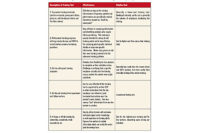At a meeting of the Dairy Practices Council in Columbus, Ohio, Matt McKnight, vice president, market access and regulatory affairs of the U.S. Dairy Export Council, made a strong point about the opportunities for the U.S. dairy industry to expand the 5% to 10% (depending on the year) dairy export volume to the world.
At a meeting of the Dairy Practices Council in Columbus, Ohio, Matt McKnight, vice president, market access and regulatory affairs of the U.S. Dairy Export Council, made a strong point about the opportunities for the U.S. dairy industry to expand the 5% to 10% (depending on the year) dairy export volume to the world.
It is my observation that a factor exists that could prevent the U.S. dairy industry from becoming the leader in this market, i.e. the lack of qualified staff. There is currently a significant loss of institutional dairy processing knowledge in the dairy industry caused by retirement of the baby-boom generation. Professional sport teams use a farm team system to prepare players with interest and talent to play in the major leagues and replace aging talent.
Unfortunately, the U.S. dairy industry does not have a similar system to call up qualified dairy plant replacements. This loss of employee expertise will impact the U.S. dairy industry’s ability to be competitive and translates into a higher risk of food safety problems.
Over the past 15 years, the U.S. dairy processing industry has relocated into drier climates and less populated areas, such as west Texas, New Mexico, Arizona, Nevada, southern Idaho and Indiana. The base for dairy plant employee recruitment is generally within a few hundred miles of these newer plants. Yet, in many cases, the nearby junior colleges and universities have not adjusted their curriculum to prepare potential dairy employees to be effective immediately upon entering the dairy plant.
With no farm team to bring qualified and properly educated candidates into the dairy plant and an over-reliance on on-the-job training (OJT), new employees lack a fundamental understanding of dairy processing and the susceptibility of its primary ingredient, raw milk, to microbiological contamination.
Recent audits and reviews of a few plants have identified unacceptable employee operational practices, partly because of over-reliance on OJT. Examples include improper storage of ingredients and packaging; uncovered tank ports, vats and filler bowls; uncapped product manifold ends; product leakage at piping joints, pump and valve connections (product coming out means bacteria can go in); visible product build-up on conveyor tracks; dried and cooked product residue on the external portions of pasteurizer plates; ends of product jumper hoses on or near the floor; and colored brushes and cleaning containers located outside of their assigned use areas.
Any of these are contamination events since all can result in direct microbiological contamination of ingredients, packaging or product. The use of pasteurization and equipment sanitization are not acceptable reasons to allow contamination events to occur or continue in a dairy plant. Contamination events (or the lack thereof) are important measures of a dairy plant’s food safety culture and level of employee knowledge.
Management lacks knowledge, too
Another real example of the knowledge gap facing the U.S. dairy industry is that one large dairy processor hired senior management staff responsible for overseeing processing and continuous improvement with no practical dairy industry background. One reason for such hires may be a lack of qualified candidates in the U.S. dairy industry. The problem of finding qualified employees at all levels of the U.S. dairy processing industry is increasing, judging by the calls and emails from headhunters and others.
The financial difficulties facing the National Collegiate Dairy “Judging” competition is another example of a strong need for the U.S. dairy industry to step up and support a farm system feeder program since participants in this contest have been a good source of qualified employees for the dairy industry. Past contestants participating in the contest can be found today in leadership positions throughout the U.S. dairy industry.
To address the over-reliance on OJT and minimize contamination events, a serious review is needed of the curriculum of U.S. junior colleges and universities that provide degree programs orientated toward dairy processing. While some states (including California, New York, Oregon, South Dakota, Vermont and Wisconsin) have strong college-level dairy processing programs, these programs are too few and too far between.
What young employees need to know
In order to be of value to a dairy processing plant, a new employee working in dairy operations or quality assurance/quality control needs exposure to dairy chemistry, microbiology, root-cause analysis, fluid dynamics, operational characteristics of dairy processing equipment, the functional application of HACCP, desired sensory characteristics of dairy products and governmental requirements impacting the dairy processing industry.
In summary, the loss of dairy-focused curriculum at junior colleges and universities is creating a technological knowledge gap for the U.S. dairy industry that has the potential of inhibiting its domestic and international competitiveness and increasing food safety risks.
By creating an ad hoc task force, business leaders and dairy educators can hold a serious discussion about establishing a farm team structure. A feeder system, just like in professional sports, would create a dairy curriculum for use by junior colleges, as well as curriculum for university bachelor and masters programs to provide qualified employees.
The task force also should develop an ongoing financial support program for the National Collegiate Dairy Judging Contest. Working together, all parts of the U.S. dairy industry can use the farm team structure to maintain and improve on its world-class status and expand domestic and international markets while assuring the safety of dairy products.
Allen R. Sayler is vice president, food safety, technology and regulatory solutions of Randolph Associates Inc. He can be reached at allen.sayler@raiconsult.com.


